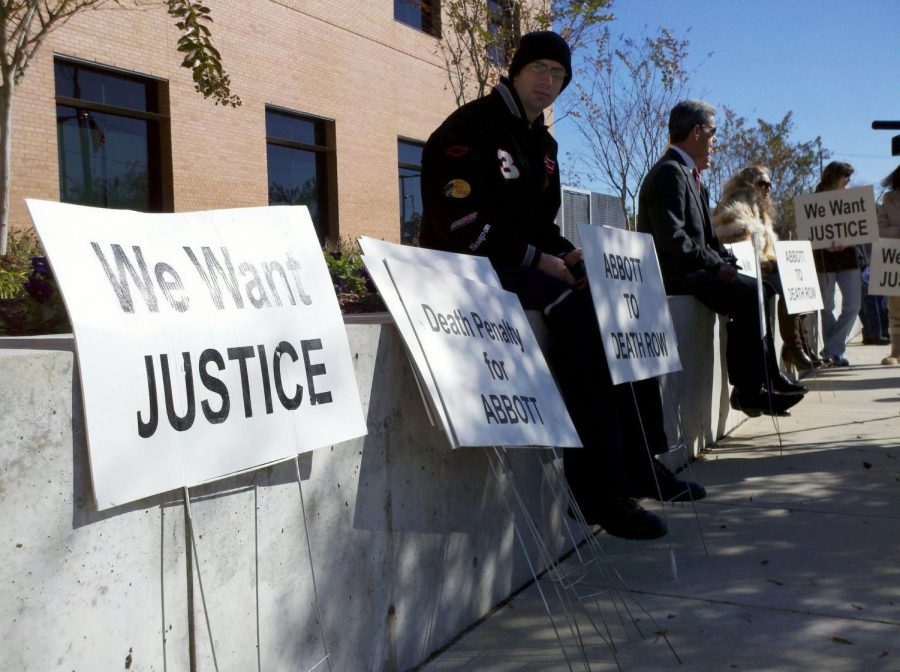THE DEATH PENALTY: THE EPITOME OF JUSTICE
Photo courtesy of AL
Pro-death penalty march in Bessemer Courthouse
In 2012, the parents of Mary Snyder and Mandy Myers rejoiced as the state of Arizona executed the man who kidnapped, ruthlessly raped, and butchered their 13 year-old daughters, leaving their bodies in a mine shaft. Unlike his victims, an unconscious Richard Dale Stockley passed away in his sleep in a far more dignified manner. However, 8 years after the death of this brutal killer, media outlets produced headlines claiming, “The Death Penalty is Cruel and Unusual.”

Mandy Meyers and Mary Snyder (left to right), raped and murdered by Richard Stokley
In fact, an overload of similar media statements villanizing the justice system and sympathizing with criminals has induced an era of an anti-death penalty sentiment which is dangerously permissive of criminal behavior. The truth is, capital punishment is neither cruel nor unusual.
Aristotle once said that “evil lies in the extremes.” Only a small population of criminals truly deserve capital punishment, but the fact that they exist cannot be disregarded. Considering it is the court’s responsibility to inflict punishment proportionate to the gravity of an offense, even life in prison would be grossly disproportionate to the heinous nature of some crimes.
Charles Ponzart, Criminal Justice Teacher, elaborated: “When you look at the crimes that some of these people commit… I mean even [lethal injection] is far too lenient.”
The majority of anti-death penalty arguments fail to address fundamental moral questions and instead focus on the possibility of accidently executing an innocent person, or claim life in prison to be cheaper than capital punishment.
These arguments do not prove that ruthless criminals deserve to keep living. Once a confirmed criminal is considered, only one question determines the integrity of the death penalty: Do inhumame murderers, sadistic child-rapists, and worse, deserve to keep living after destroying the lives of entire families? The answer is undoubtedly no.
Regardless, it is important to address some of these arguments. Black convicts are grossly overrepresented on death row when their overall population is considered. Currently, 40% of inmates are black — nearly three times the proportion of their general population. Death penalty opponents are quick to label this as an example of racism; in reality, the capital punishment system is not as permissive of bias as some may believe.
Robert Blecker, a law professor at NYU, confirms this, explaining, “Fortunately, as we raise the stakes we drastically reduce the mistakes. Before we condemn [a convict] to die, [the justice system] requires a higher burden of persuasion than proof beyond ‘a reasonable doubt.’ [Instead] A jury needs to be convinced ‘to a moral certainty’ that he deserves to die.”
Ponzart agreed, stating, “I’ve seen judges; if there is the slightest doubt in their mind, they’ll toss the case out. They’d rather let a thousand guilty people go free than let one innocent person go to jail.”
Despite that, the statistic still remains that African Americans are overrepresented on death row. Correctional authorities state they target criminal behavior, and human behavioral experts state that difficult environments breed criminal behavior. Consequently, the statistic of minorities being overrepresented on death row may be linked to minorities being overrepresented in unstable neighborhoods where dangerous influences and accepted criminal behavior compromise the population’s sense of morality. Evidently, a better alternative to terminating the death penalty may be to terminate street fights and unstable environments that foster the type of people who commit capital cases. The futures of far too many American neighborhoods have been demolished by the effects of poverty, despite being under direct supervision of the federal government. The real solution would be for the government to prioritize improving the status of the lower class – be it through increasing jobs, investing in high-quality education, or promoting social welfare programs.
Moreover, the fact that the justice system is not foolproof needs to be accounted for. It is true convicts have been wrongfully executed in the past, 4% to be specific. However, in this era of modern DNA testing, dependable technology, and the ability for defense lawyers to appeal cases repeatedly, it is futile to compromise the undeniable justice served by the death penalty in fear of taking a risk. The responsibility of the justice system to carry out its duty and inflict capital punishment is a heavy weight– one that needs to be prioritzed above all else.
It is also true that capital punishment costs more than life in prison. However, this is not because of the lethal injection itself, which costs around $100, but the protracted appellate process.
Inmates spend years, sometimes decades, awaiting execution. During these years, attorneys spend millions to conduct trials on the criminal’s behalf, embracing every opportunity to issue appeals. The real issue is not the sentence itself, but these futile outside costs. By simply shortening this appeals process, not only would capital punishment finances drop significantly – but the death penalty would also become a potent measure to deter crime.
According to Ponzart, “Prisoners stay in death row for decades… [Capital punishment] can only be a deterrent if it works quickly. It needs to be investigated and done within 2 years maximum.”
However, the wheels of justice move slow. It may be financially detrimental to alter the long-maintained appeals process. But even considering the extensive price, the death penalty remains as a vital aspect of the justice system.
Everyone is entitled to their own opinion, but not their own facts. The fact is that barbarous killers like Richard Dale Stokley will never cease to exist. To sentence killers like these, who intentionally butcher and terrorize their victims, to anything less than death would not only fail to achieve justice, but it would shamelessly endorse crimes against society.






